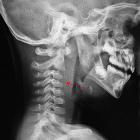Grisel-Syndrom
Grisel syndrome is a rare cause of torticollis that involves subluxation of atlanto-axial joint from inflammatory ligamentous laxity following an infectious process in the head and neck, usually a retropharyngeal abscess.
Epidemiology
It usually occurs in infants or young children.
Clinical presentation
Grisel syndrome has a variable presentation, time between inciting event and symptom onset is variable, and laboratory investigations may be normal. So diagnosis is difficult. However, typically presentation consists of :
- torticollis
- cervical pain
- symptoms related to underlying infection
Neurological complications can range from radiculopathy to death from medullary compression .
Pathology
Etiology
The syndrome may result from any inflammatory process of the head and neck. The most common etiologies are as follows:
- upper respiratory tract infections
- tonsillectomy/adenotonsillectomy
- otitis media
- other ENT infections/surgery
The causative organisms are usually :
- Staphylococcus aureus
- Group B. Streptococcus
- oral flora
Radiographic features
Plain radiographs are of limited value in establishing a diagnosis. Best investigation is CT, which demonstrate abnormal lateral placement of C1 on C2, and of occipital facets on C1. MRI may be useful in evaluating inflammatory changes in the surrounding soft tissues.
Treatment and prognosis
In milder cases and with early diagnosis, treatment with broad spectrum antibiotics and soft collar is sufficient. Delayed diagnosis / increasing severity needs treatment with traction brace.
Residual subluxation after 8 weeks of treatment or neurological symptoms may require operative treatment.
Differential diagnosis
- abnormal ligament laxity
- Down syndrome
- connective tissue diseases
- cervical spine instability
- undetected trauma
Siehe auch:

 Assoziationen und Differentialdiagnosen zu Grisel-Syndrom:
Assoziationen und Differentialdiagnosen zu Grisel-Syndrom:





